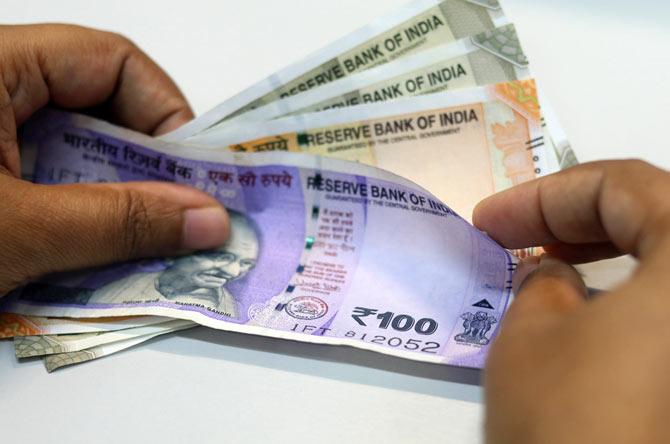Ask your bank to save for you.
Plan your taxes.
Reward yourself for your addictions...
Chartered accountant Shreya Jaiswal's 10 ways to make more money this year.

A new year means a new opportunity for us to make and break new resolutions. But this year, let's plan it a little different. Let's build on some habits instead of making resolutions.
The world is anyway talking about how badly the recession is going to hit each one of us. So what better time to develop some financial habits that will help us save more?
I know, I know, saving money isn't that easy as it sounds! But you need not worry, because I have got you 10 smart ways that will help you save more in 2023.
1. Plan your taxes
Plan your taxes at the start of the year and not at the end.
Most salaried individuals are unaware that they can increase their take-home earnings and also save on their income tax outflow by simply re-structuring their salary. But unfortunately, they feel this pinch only at the year's end and in many cases much later, which is at the time of filing their income tax returns.
That is why it is important to meet your CA at the beginning itself and explain your sources of income to structure it in the most efficient way.
2. Ask your bank to save for you
Sweep-in sweep-out facility is available in almost all banks and requires just one-time instruction to be given to your bankers wherein you can set a threshold amount in your savings account after which the excess will automatically be transferred to a regular Fixed Deposit account.
Whenever your account balance falls below the minimum balance requirement, the equivalent amount will automatically be transferred back from your FD to your savings a/c. It will not only minimise your spending but also help you earn extra interest, without any effort on your part.
3. Pay yourself first
Make sure you plan your SIPs and other investments in a way that the money gets debited from your bank at or around the same time that your salary gets credited.
This way you will have a limited budget in your hand during the month to pay others for your lifestyle expenses.
4. Plan your holiday in advance
We all need a break once in a while to ease the stress. But instead of feeling relaxed, our vacation budget only adds to our financial stress because of the sizeable hole that it brings to our pockets.
However, a 2-month advance planning will help you get the best deals on flights and hotels, which can help you save as high as 50% on your travel budget.
Also if you are someone who does not enjoy the tourist crowd then it is always best to plan your trip for the off-season.
5. Reward yourself for your addictions
Say you are someone who loves going to restaurants and clubs frequently or is addicted to non-essentials such as a regular coffee from your favourite café.
Then make sure that for every amount that you spend there, an equivalent amount is transferred to a separate bank account dedicated to your savings.
Once there is a considerable corpus in that account, invest it. But make sure you don't obtain a UPI or a debit card for this account else there are high chances you might spend that too.
6. Start paying yourself rent
If you are someone who is living in a debt-free house and is not owned by you, start paying rent to yourself.
Calculate the rent of your house and your specific room.
Start a SIP for that amount. This way you will not only save more but it will also be a constant reminder that you need to earn more to be able to afford your own house.
After all, house rent or house EMIs need to form a part of your lifestyle cost, which most of us tend to ignore because, in India, we live in our parent's house.
7. Get medical insurance
India's medical inflation is rising at a rate of 15%.
A Rs 10 lakh operation today will cost you Rs 40 lakhs in 10 years and one simple medical procedure can rob you of your life savings.
Medical insurance not only helps you save on your medical costs, but also helps in the early detection of diseases by offering you free health check-ups which you would not take otherwise.
Also, did I mention that it helps you save on income tax by allowing you a deduction under section 80D?
8. Compare your purchase cost with your hourly wages
Every time you are about to make a moderately expensive purchase, say for example you want to buy branded shoes worth Rs 8,000, compare that price with your hourly rate -- how many hours or days would it take for you to earn that amount?
Then decide, whether it's worth it or not.
This hack will help you to spend as per your income and keep your lifestyle inflation in check.
9. Choose shorter loan tenure over shorter EMIs
Contrary to popular opinion where people ask you to choose shorter EMIs and invest the excess in mutual funds to earn the differential interest, I suggest going for the maximum EMI you can afford.
The truth is you can never accurately predict the markets, or inflation, or recession for that matter.
Bad times not only reduce your income but also increase the cost of your debt.
So if you are someone who is not an expert in understanding the market, it is always wise to pay off your liabilities to save more in the long run.
10. No-spend challenge
Dedicate one day a week to zero spending.
No, no I am talking about the weekends because, after all, you need to enjoy your life. Say you choose Thursdays, then make sure you don't spend any amount that day apart from your work travel cost.
Even if it is buying fruits or vegetables, choose to make from the leftovers.
Use your home time to detox.
You'll be surprised at your ability in cutting down unnecessary expenses and eventually save more.
Shreya Jaiswal is a chartered accountant from The Institute of Chartered Accountants of India. She is a finfluencer who holds specialisation in direct taxes.











 © 2025
© 2025